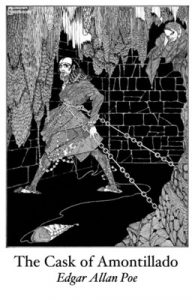Introduction to Edgar Allan Poe
Edgar Allan Poe was born in the year 1809 in Boston, Massachusetts to parents who were professional actors, part of a repertory company. Sadly, when Poe was three, both his parents died. After that, he was sent to live with John Allan, a wealthy exporter who never really adopted him legally. In the story, ‘The Cask of Amontillado, which was written in 1846, the narrator, Montresor, opens the story by saying that he wants to exact revenge from Fortunato. This he says because Fortunato has irreparably insulted Montresor.
This prompts him to exact revenge on Fortunato. But he wants to do this in secret; without putting himself at risk. He decides to use Fortunato’s love of wine to do this. During a carnival, Montresor approaches him and asks him to taste ‘Amontillado’, a light Spanish sherry. He cunningly says that if he’s too busy, he would ask Luchesi to taste it. He is sure that Fortunato will taste the wine because he looks down upon Luchesi as a rival and thinks that he cannot tell the difference between sherry and wine. Let us see an excerpt of the story:
The Cask of Amontillado

THE thousand injuries of Fortunato I had borne as I best could, but when he ventured upon insult I vowed revenge. You, who so well know the nature of my soul, will not suppose, however, that gave utterance to a threat. At length I would be avenged; this was a point definitely, settled –but the very definitiveness with which it was resolved precluded the idea of risk. I must not only punish but punish with impunity. A wrong is unredressed when retribution overtakes its redresser. It is equally unredressed when the avenger fails to make himself felt as such to him who has done the wrong.
It must be understood that neither by word nor deed had I given Fortunato cause to doubt my good will. I continued, as was my wont, to smile in his face, and he did not perceive that my smile now was at the thought of his immolation.
He had a weak point — this Fortunato — although in other regards he was a man to be respected and even feared. He prided himself on his connoisseurship in wine. Few Italians have the true virtuoso spirit. For the most part their enthusiasm is adopted to suit the time and opportunity, to practise imposture upon the British and Austrian millionaires. In painting, Fortunato, like his countrymen, was a quack, but in the matter of old wines he was sincere. In this respect I did not differ from him materially; –I was skilful in the Italian vintages myself, and bought largely whenever I could.
It was about dusk, one evening during the supreme madness of the carnival season, that I encountered my friend. He accosted me with excessive warmth, for he had been drinking much. The man wore motley. He had on a tight-fitting parti-striped dress, and his head was surmounted by the conical cap and bells. I was so pleased to see him that I thought I should never have done wringing his hand.
I said to him –“My dear Fortunato, you are luckily met. How remarkably well you are looking to-day. But I have received a pipe of what passes for Amontillado and I have my doubts.”
“How?” said he. “Amontillado, A pipe? Impossible! And in the middle of the carnival!”
“I have my doubts,” I replied; “and I was silly enough to pay the full Amontillado price without consulting you in the matter. You were not to be found, and I was fearful of losing a bargain.”
“Amontillado!”
“I have my doubts.”
“Amontillado!”
“And I must satisfy them.”
“Amontillado!”
“As you are engaged, I am on my way to Luchresi. If any one has a critical turn it is he. He will tell me –”
“Luchresi cannot tell Amontillado from Sherry.”
“And yet some fools will have it that his taste is a match for your own.
“Come, let us go.”
“Whither?”
“To your vaults.”
“My friend, no; I will not impose upon your good nature. I perceive you have an engagement. Luchresi–”
“I have no engagement; –come.”
“My friend, no. It is not the engagement, but the severe cold with which I perceive you are afflicted. The vaults are insufferably damp. They are encrusted with nitre.”
“Let us go, nevertheless. The cold is merely nothing. Amontillado! You have been imposed upon. And as for Luchresi, he cannot distinguish Sherry from Amontillado.”
Thus speaking, Fortunato possessed himself of my arm; and putting on a mask of black silk and drawing a roquelaire closely about my person, I suffered him to hurry me to my palazzo.
There were no attendants at home; they had absconded to make merry in honour of the time. I had told them that I should not return until the morning, and had given them explicit orders not to stir from the house. These orders were sufficient, I well knew, to insure their immediate disappearance, one and all, as soon as my back was turned.
Analysis
The terror or shall we say complexity of “The Cask of Amontillado,” is in the lack of evidence that accompanies Montresor’s claims to Fortunato’s “thousand injuries” and “insult.” This means that the story features Montresor as judge, jury and executioner in exacting ‘revenge’ upon Fortunato. These thousand insults and injuries are nowhere tangible in the story, which leaves us with punishment without proof. This further goes on to be the true horror of the story.
The rest of the story will be explained in Parts 2 and 3.